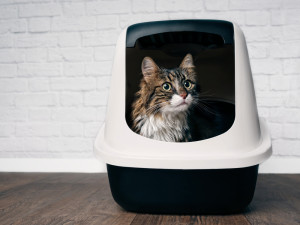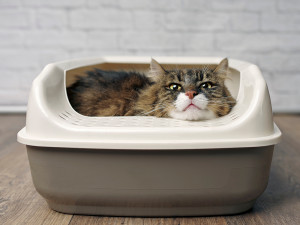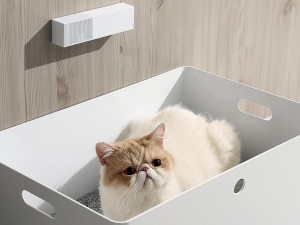Best Kitten Dewormer
Because the early bird isn’t the only one who gets the worm(s).
In This Article:
Choosing the Best Kitten Dewormer Best Kitten Dewormer Brands How to Deworm a Kitten
“The worms crawl in, the worms crawl out, the worms play pinochle on your snout...” Who else is going to have this tuneopens in new tab (you might call it an earworm) stuck in their head all day? In the case of kittens, the worms may, unfortunately, be crawling in and out of their digestive systems. I’ll never forget the day that, not long after we brought one of our kittens home, my daughter told me that a worm was hanging out of her tiny, adorable butt. Then there was the time another one of our kittens threw up what looked like a pile of spaghetti — except it was wiggling. (Apologies if you’re reading this during lunch.) Yup, it was worms! (Roundworms, to be exact.)
Kittens are prone to various types of worms, which can cause a range of health issues, such as diarrhea, if left untreated. Choosing the best kitten dewormer is essential to ensure your cat stays healthy and free from harmful parasites.
Besides roundworms, there are also hookworms, tapeworms, and whipworms that could be affecting your kittenopens in new tab. (Cats can even get heartworm, but that’s a whole different issue.) Symptoms of worms may include diarrhea, vomiting, lethargy, a swollen tummy, weight loss, dull fur, and even bleeding from the anus.
If you think your kitten might have worms, a trip to the vet is in order. Veterinarian Dr. Laria Herod, associate veterinarian and veterinary advisor to Whisker, says it’s essential that cat parents have their kitty’s stool tested at the vet to find out which type of worms you’re dealing with. “Start with a fecal examination at the veterinarian so that the appropriate medication, whether prescription or over-the-counter, can be recommended,” she says.
How much do you spend on your pet per year?
Grossed out? Intimidated? Worried about your sweet little worm-infested friend? Don't sweat it. Worms are common, and they’re usually easily treated. So stop squirming and read on to find out everything you need to know about how to deworm a kitten.
Choosing the best kitten dewormer
If you’re concerned about figuring out which kitten dewormer is best, put your mind at ease: Your veterinarian will likely tell you exactly what you need to know. You’ll just need to give them a little bit of your cat’s poop so they can test it. It’s not fun, but it’s necessary!
“The most effective way to approach deworming for kittens is to submit a fecal sample to your veterinarian, so that the presence of worms can be confirmed and targeted treatment can be implemented,” Dr. Herod says.
Broad-spectrum dewormers
Rather than treating one specific type of worms, a broad-spectrum dewormer treats a whole host of intestinal worms. These include tapeworms, hookworms, and roundworms. “Many veterinary offices will give a broad-spectrum dewormer as a part of the preventative care that comes with a wellness visit,” Dr. Herod says.
Targeted treatment
A targeted dewormer, as you might guess, is used for a specific type of worms. “If the kitten is having an issue with diarrhea or general gastrointestinal upset, or if there is concern of having seen worms in the kitten’s feces, targeted treatment will have them feeling better and back to themselves a lot faster,” Dr. Herod says.
Prescription vs. over-the-counter dewormers
Deworming a kitten doesn’t have to mean getting a prescription from your vet, Dr. Herod says — although you will want to have your kitten examined to determine what type of worm you’ve got on your hands. Once you know, however, you can likely pick up an over-the-counter deworming treatment.
“Many over-the-counter products use the same active ingredients as prescription medications, and are very effective,” Dr. Herod says. “The most important part of using over-the-counter medications is to consult with your veterinarian to ensure that your kitten is getting the most efficacious treatment schedule in light of their particular worms.”
Best kitten dewormer brands
When you’re looking to deworm your kitten (or kittens!), you'll run into several common brands of medication. The following are a few popular brands your veterinarian may recommend. Dr. Herod says they’re all “great products that, when used correctly and for an appropriate amount of time, help to resolve worm issues.”
Drontal
Drontal is a broad-spectrum dewormer opens in new tab that’s safe for use in kittens. It’s a prescription medication that helps eliminate tapeworms, hookworms, and roundworms. Drontal tablets are scored, so you can easily cut them in half and give the prescribed dose.
Panacur
Panacur is a brand name for fenbendazole, which is a broad-spectrum medicationopens in new tab that treats a variety of parasites, including roundworms, hookworm, and whipworm (among others). It’s approved for use in dogs, and is used off-label in cats.
Pyrantel
Pyrantel is another broad-spectrum medication opens in new tab that treats a variety of worms — and it’s the one Dr. Herod says she uses most often. “I use Pyrantel daily on the majority of our healthy patients as a routine preventative care treatment,” she says.
Praziquantel
Used to treat tapewormopens in new tab, praziquantel is safeopens in new tab for use in kittens six weeks and older. Tablets are crushed and mixed into your cat’s food, or given directly by mouth (if you can get them to take it). Only give it to your kitten if directed to by a veterinarian — this goes for all of these medications.
How to deworm a kitten
So how, exactly, do you deworm a kitten? It’s not as difficult as you might fear. If you think your cat might have worms, give your vet a call — and be prepared to get into your cat’s litter box with a vial and a utensil of some sort so you can scoop some poop for lab analysis. Your veterinarian will take it from there and tell you what you need to do.
How much dewormer should you give a kitten?
To figure out how much dewormer your kitten needs, simply follow the directions on the packaging — or whatever your veterinarian has told you, if that’s different.
Kitten deworming schedule
When you adopt a kitten, be prepared to deworm them more than once. Kittens are especially susceptible to roundworms (the ones we saw crawling out of our kitten’s butt, and squirming around in their vomit).
Your vet, or the shelter where you adopted them, should be able to tell you how often the kittens need to be dewormed, but generally, it’s every two weeks from the time the kittens are three weeks old until they are eight weeks old, and then once a month until they reach six months of age.
How to deworm a kitten naturally
When a natural treatment is available, some pet parents prefer to go that route. However, when it comes to worms, Dr. Herod recommends sticking with one of the medications listed above. “There is not a widely accepted, safe, natural way to deworm kittens,” she says.
What to expect after deworming a kitten
While kitten deworming medications are generally a safe, effective way to rid your feline friend of the squiggly wigglies, they do come with some side effects — as do all medications, Dr. Herod says.
“For dewormers, it is possible to see some gastrointestinal upset, diarrhea (if they weren’t already having it), and even some nausea,” she says. “These symptoms typically resolve on their own throughout the treatment, but if they linger longer than a few days, please consult with your veterinarian.”
She also says that, depending on what type of worms your kitten has, you should be prepared to see some worms in your kitten’s poop. That's why it’s even more important to be on top of scooping and cleaning the litter box during deworming treatment.
FAQs (People also ask):
We asked Dr. Herod to answer some of the common questions cat parents have about deworming a kitten. Here's what she told us.
What is the best kitten tapeworm dewormer?
“Tapeworms are intestinal parasites, and require oral or injectable medication to eliminate the worms,” Dr.Herod says.
What is the best kitten dewormer for all worms?
“There is no ‘one size fits all’ dewormer,” Dr. Herod says. “While many dewormers do address more than one type of intestinal parasite, they specifically treat the worms that they are labeled for.”
What is the best ringworm kitten dewormer?
“Ringworm is a bit of a misnomer, as it is a skin infection caused by a fungus, not a worm,” Dr. Herod says. “Treatment for ringworm often calls for topical antifungal medication, although the treatment does vary based on severity.”













